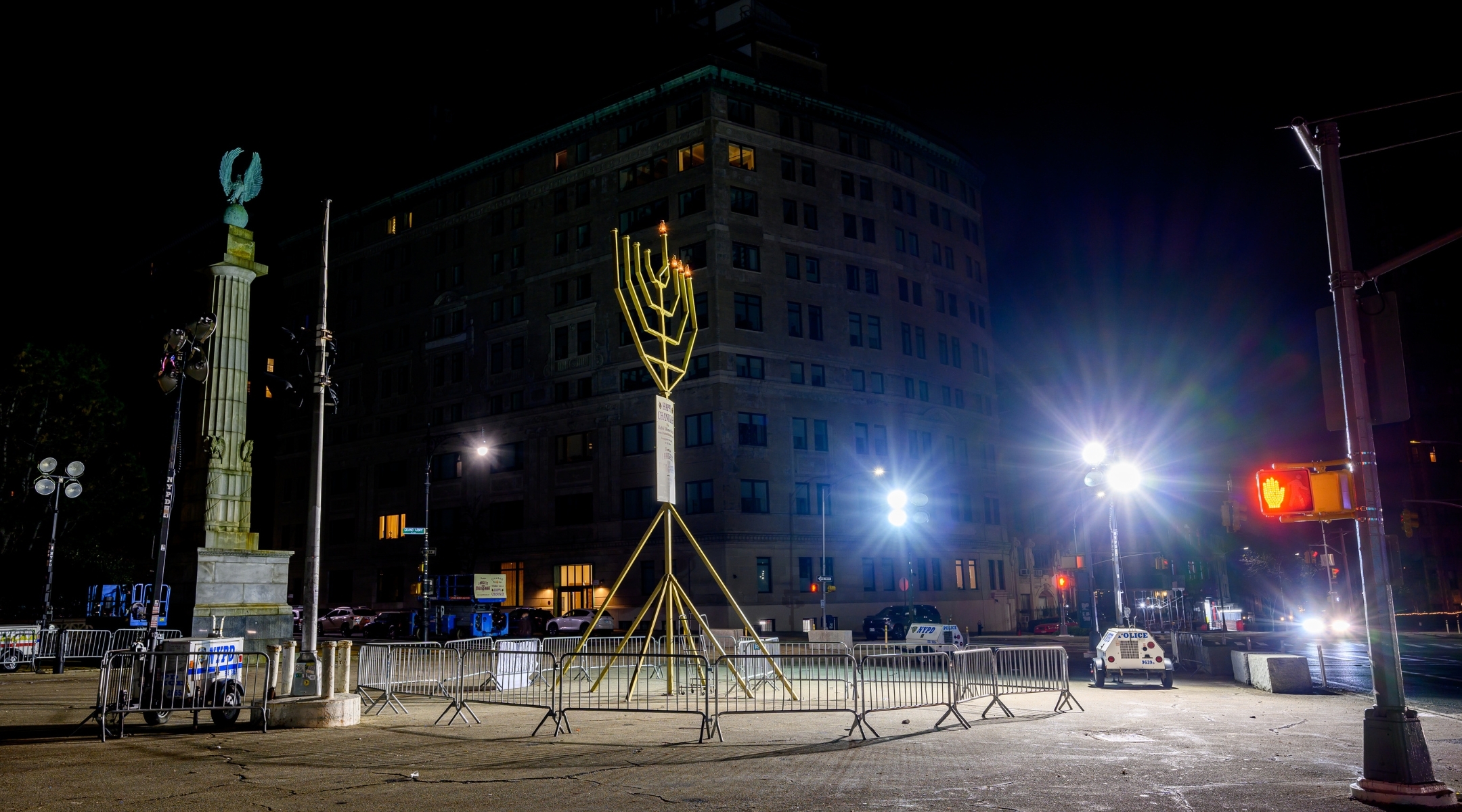As drought conditions continue to put New York City at an elevated risk of fire, Rabbi Shimon Hecht needs a Hanukkah miracle.
Hecht, who leads Chabad of Park Slope, oversees the annual illumination of a massive, 32-foot tall menorah at Brooklyn’s Grand Army Plaza, just outside the main entrance to Prospect Park. Since 1984, the kerosene lantern menorah has been lit each of the eight nights of Hanukkah, which this year begins on the evening of Dec. 25.
That four-decade tradition could now be snuffed out. A drought watch escalated into a drought warning in late November, putting public menorah lightings at risk of being canceled. On Nov. 20, the mayor’s office, plus the city’s fire and parks departments, announced the cancellation of already-issued permits for fireworks displays and open flames across the entire city indefinitely. The three offices also announced the suspension of new permits for open flames — meaning that, in addition to New Year’s Eve fireworks, public menorah lightings like Hecht’s may be canceled.
The FDNY will review previously-issued permits for activities in city streets or over water on a “case-by-case basis” to determine alternatives, the mayor’s office said in the Nov. 20 email announcing the change.
“While the drought guidelines are in effect, no displays with open flames, including menorahs, will be allowed in parks,” a representative from the NYC Parks Department told the New York Jewish Week. “If organizers had previously been issued a permit for open flame displays we are asking them to develop a contingency plan (for example replacing the flame with electric lights).”
Hecht is still hoping that the city won’t let the light go out. He said he sent a letter to the mayor’s office last week, asking them to reconsider the ban — at least in the case of Chabad of Park Slope’s menorah.
Many menorahs put up by Chabad houses around the city use light bulbs rather than real flames — such as those of Chabad at Sutton Place and Chabad of Harlem — and will not be impacted by fire restrictions. But the Park Slope menorah — which was known, until 2016 at least, as “the world’s largest menorah” — uses flames ensconced in old-fashioned kerosene lanterns. (Chabad of the West Village uses a similar kerosene lantern and flame setup for their menorah.)
“We don’t believe that our menorah poses any type of fire risk whatsoever,” Hecht said. “The fire itself is not just an open flame. It’s in a kerosene lantern, it’s protected. And as well as it’s not directly in the park, it’s outside the park. So from fire safety — there really is no concern whatsoever. We’ve been doing it for the last 40 years, thank God, without any incidents and concerns.”
Chabad of Park Slope’s menorah lightings typically draw a few hundred people each night over the course of the eight-night holiday and the celebrations often include live music, hot chocolate, latkes and more.
The drought warning is still in effect. Despite the small amount of rain last week, New York City’s seven reservoirs are averaging far below the normal 82% fill mark for this time of year. As of Thursday morning, the reservoirs are, on average, 59.7% full.
“Thank God it did start raining in the city a little bit,” Hecht said of the drought conditions. “Last week, we had a number of days of rain. So I think that should have helped a little bit, maybe just a drop in the bucket, as they say, but it’s a good start, at least. So we’re hoping that the mayor’s office will come to understand.”
As of press time, at least two other events, both on New Year’s Eve, have been canceled or reimagined for this year due to the drought.
New York Road Runners, which organizes an annual New Year’s Eve four-mile race and fireworks show in Central Park, told The New York Times that City Hall and the New York Parks Department had asked the group to forgo its annual fireworks display due to the risk. In Prospect Park, the annual fireworks will be replaced by a drone light show at Grand Army Plaza.
The burning question of whether the menorah lighting will go ahead remains unanswered. But Hecht is trying to look on the bright side.
“I know the mayor cares deeply about the Jewish community, has worked with us since he’s become mayor — even before then, as borough president,” Hecht said. “So I don’t imagine that he would want to dim the lights and put out the flames on this Hanukkah.”
The New York Jewish Week brings you the stories behind the headlines, keeping you connected to Jewish life in New York. Help sustain the reporting you trust by donating today.





